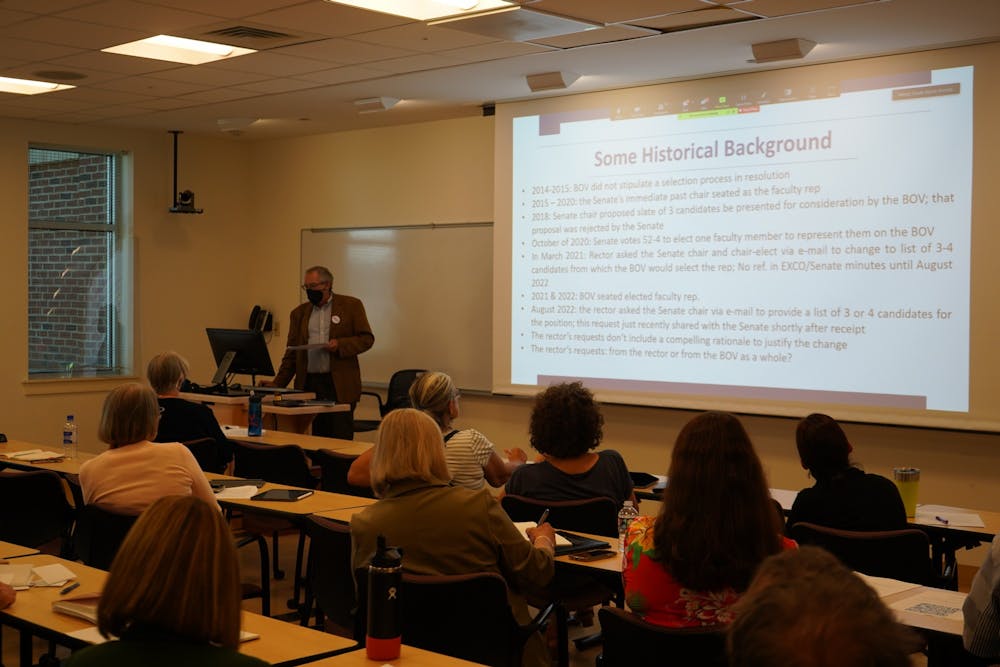The University’s chapter of the American Association of University Professors submitted a letter urging the Faculty Senate to compromise with the Board of Visitors on its recent request to change the way the faculty representative to the Board is selected.
The AAUP is a nonprofit membership organization composed of professors and other academics, with over 500 local campus chapters in the U.S.
“Both options would ensure that the Board has oversight of the qualifications of the individual seated as faculty representative and that the representative elected by the Senate has the support of a majority of Faculty,” the letter reads.
At its recent meeting, the Faculty Senate discussed an amendment that would enable the Senate to select a slate of three candidates, from which the Board would select one individual from the group to serve as representative. Currently, the Faculty Senate elects one non-voting representative to sit on the Board independently.
The debate surrounding the process hinges on the bylaw’s current wording, which reads that the representative “shall be chosen from the individuals.” While some senators interpret the bylaw to mean that the faculty representative must be directly elected by the Senate, others feel that electing a slate of candidates is sufficient.
The letter, sent to Rector Whittington Clement and Patricia Jennings, chair of the Faculty Senate and professor of education, outlines two possible compromises for the representation issue — neither of which involve the adoption of the proposed amendment that would change the Faculty Representative election from a direct election to a slated system.
Walter Heinecke, president of the University’s chapter of AAUP and associate professor of education, said he thinks it is in the best interest of the University for the two governing bodies to come to a compromise, adding that many faculty senators do not want to change the current bylaws.
“There is a significant amount of opposition by faculty to merely acceding to the Board’s request to give them three or four names … for them to choose from, at this point,” Heinecke said.
In the first compromise, the Board would notify the Senate of issues anticipated in the coming term so the Senate could consider the relevant qualifications of each candidate with those topics in mind.
Clement said it is not practical for the Board to anticipate the various issues that would be presented over the course of a year, however.
In the second compromise, the Faculty Senate would continue to practice elections, but acknowledge that the Board might decline their elected representative. If the elected representative is denied by the Board, the Senate would then elect another individual and allow the Board to either accept or reject that person, and so on until the position is filled.
Regarding the second compromise, Clement said the Board would not have the benefit of properly understanding the qualifications of any subsequent nominees.
Clement affirmed the importance of the faculty representative, but he added he feels the Board’s allowance of a faculty representative is ultimately a gesture by the Board, as there is no law requiring this representation. Clement said he believes the Board is entitled to evaluate any potential nominee, if they are to voluntarily allow a faculty representative.
“Having three or four nominees gives us more opportunities to evaluate whom we think would best represent the broad view of our faculty,” Clement said.
Heinecke also expressed concern with the original voting schedule for the proposed bylaws. He said the amendments were initially scheduled to be voted on at the September meeting — the same meeting at which they were introduced, which would have violated voting guidelines as described in the Senate’s current bylaws.
“A bunch of senators saw the violation of the bylaws in that process and objected to the Senate Chair,” Heinecke said. “The proposal had never been introduced at a Senate meeting. It had only been introduced at an Executive Council meeting, and that’s not what those bylaws said.”
Jennings said the vote would not have taken place at the September meeting, but would instead have been online immediately following the meeting. In response to senators’ comments about voting processes, though, she agreed to delay the bylaw amendment vote and it was rescheduled for the full Faculty Senate meeting in October.
If the vote takes place as planned, Heinecke said he hopes senators will resolve the issue in a more deliberate manner.
“I think that the senators should vote no on the proposed amendment until we can get the process started again in a way that is much more transparent and much more communicative,” Heinecke said.
At the end of the AAUP’s letter, the Executive Council requested a meeting with Clement and Jennings to discuss solutions that would satisfy the Board’s requests without amending the Faculty Senate bylaws.
Heinecke said it is his impression faculty are interested in negotiating with the Board because it is unclear why the election of a representative has been subject to change.
“We don’t know the reasons behind [the request],” Heinecke said. “The Rector has never come to a meeting to explain himself, about why he prefers to do it this way, and we don’t know if the entire Board has issued a resolution about this, or if it’s just the Rector’s preference.”







